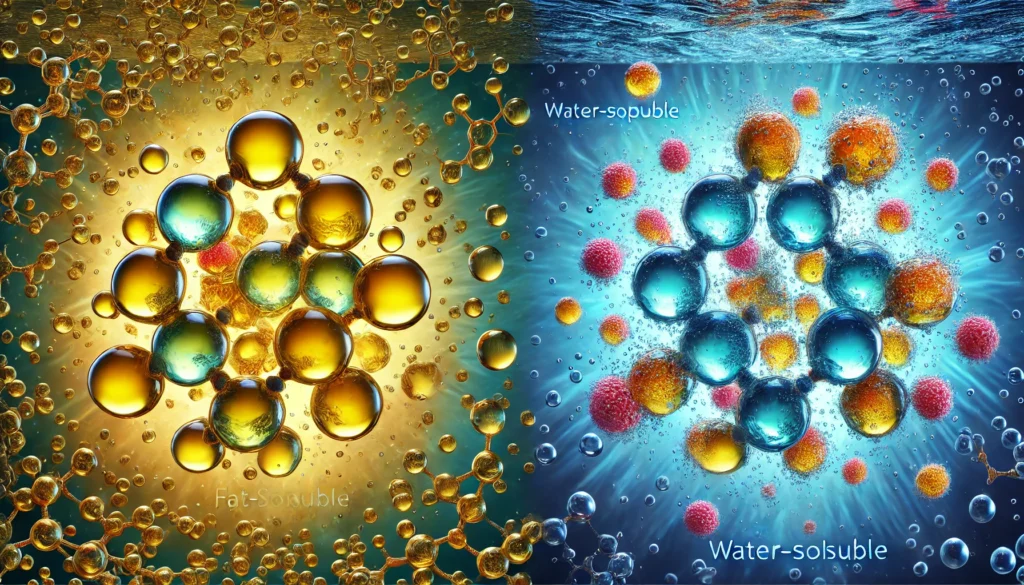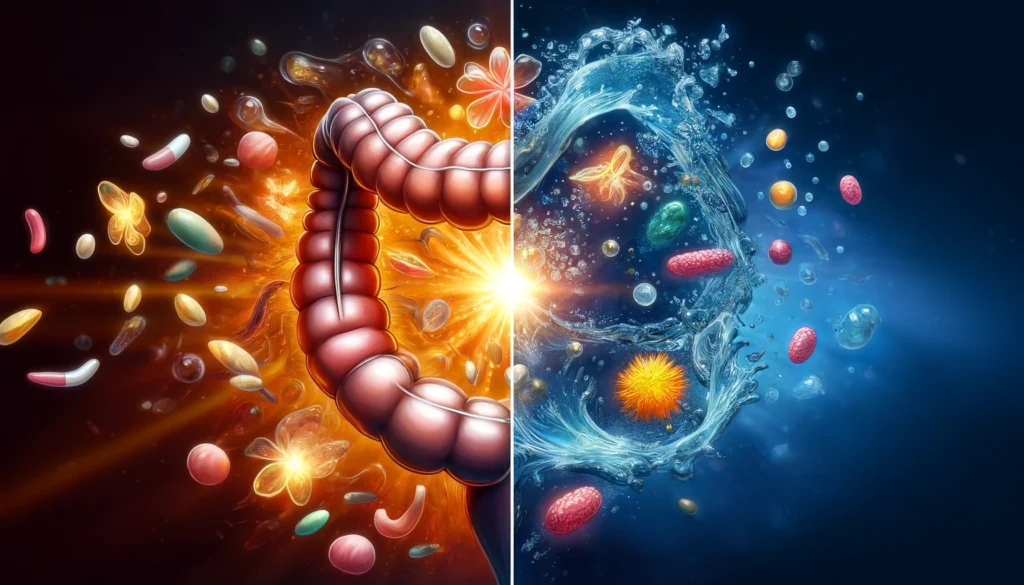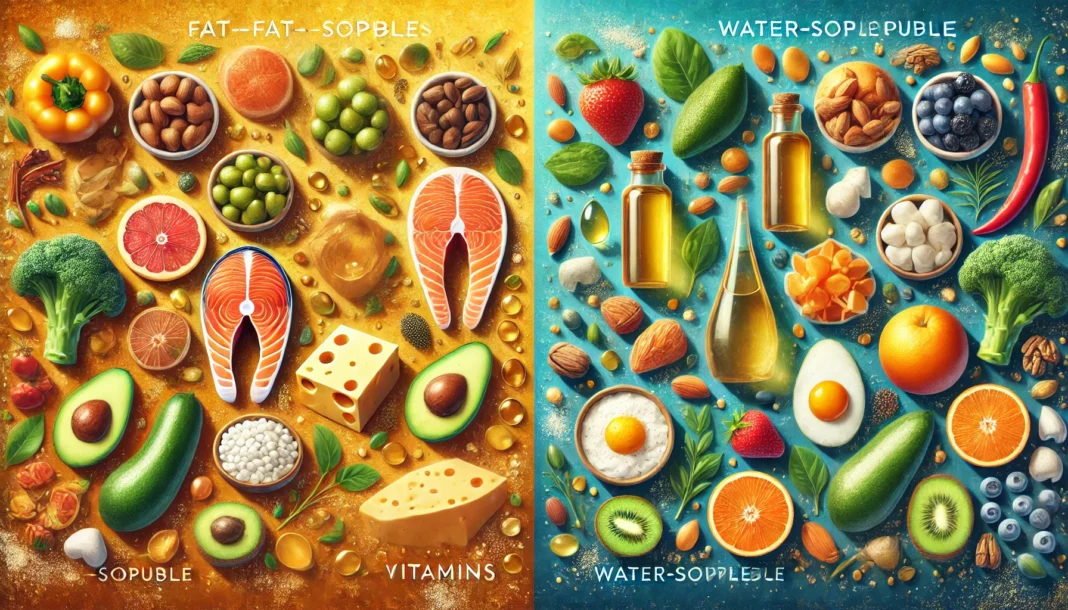Introduction
Vitamins play a crucial role in maintaining overall health, supporting essential physiological functions such as metabolism, immune response, and cellular repair. These organic compounds are categorized into two primary groups: fat-soluble vitamins and water-soluble vitamins. Understanding the differences between these two classifications is essential for optimizing nutrient absorption and ensuring proper dietary balance. The distinction between fat-soluble vs. water-soluble vitamins lies in their absorption, storage, and excretion processes, which significantly impact their bioavailability and function in the body.
You may also like: What Is Bioavailability in Nutrition? A Simple Explanation of How Nutrients Are Absorbed and Utilized
Fat-soluble vitamins include vitamin A, D, E, and K, collectively known as vitamin ADEK. These nutrients are stored in the body’s fatty tissues and liver, making them available for extended periods. In contrast, water-soluble vitamins, such as the B-complex vitamins and vitamin C, are not stored in significant amounts and must be regularly replenished through diet. The differences between these vitamin types have profound implications for health, influencing everything from vision and bone strength to cognitive function and energy metabolism.
As interest in holistic health and bioavailable nutrients continues to grow, it becomes even more critical to explore the various roles, benefits, and sources of vitamin ADEK and their water-soluble counterparts. This article delves deep into the fundamental characteristics of these vitamins, examining their functions, dietary sources, absorption mechanisms, and potential deficiencies. By understanding fat-soluble vs. water-soluble vitamins, individuals can make informed choices about their nutritional intake, ensuring optimal health and wellness.

Fat-Soluble Vitamins: Characteristics and Functions
Fat-soluble vitamins are essential for numerous bodily functions, from maintaining vision to supporting immune defense and blood clotting. Unlike water-soluble vitamins, these nutrients dissolve in fats and oils rather than water, requiring dietary lipids for proper absorption. Since they are stored in the body’s fatty tissues and liver, they do not need to be consumed daily, but excessive intake may lead to toxicity.
Vitamin A (Retinoids and Carotenoids)
Vitamin A is crucial for vision, immune function, and cell differentiation. It exists in two primary forms: retinoids, found in animal-based foods, and carotenoids, derived from plant sources. The body converts beta-carotene, a precursor found in colorful fruits and vegetables, into active vitamin A. Sources of vitamin A, D, E, and K include liver, dairy products, eggs, carrots, and spinach. Deficiency can result in night blindness and compromised immunity, while excessive intake may lead to toxicity, causing liver damage and bone abnormalities.
Vitamin D: The Sunshine Vitamin
Vitamin D is unique among vitamins because it can be synthesized by the body when the skin is exposed to sunlight. This nutrient plays a vital role in calcium absorption and bone health. The question “Is vitamin D water or fat-soluble?” arises frequently; the answer is that vitamin D is a fat-soluble vitamin. Dietary sources include fatty fish, fortified dairy products, and egg yolks. Vitamin D deficiency is widespread, particularly in regions with limited sunlight exposure, leading to conditions such as rickets in children and osteoporosis in adults.
Vitamin E: A Powerful Antioxidant
Vitamin E is best known for its antioxidant properties, which help protect cells from oxidative stress and free radical damage. This fat-soluble vitamin also supports immune function and skin health. It is commonly found in nuts, seeds, vegetable oils, and green leafy vegetables. A deficiency is rare but can lead to neurological problems and weakened immune responses. However, excessive intake from supplements may increase the risk of bleeding disorders.
Vitamin K: Essential for Blood Clotting
Vitamin K is indispensable for blood clotting and bone metabolism. It exists in two primary forms: K1, found in leafy greens, and K2, produced by gut bacteria and present in fermented foods. A deficiency in vitamin K can lead to excessive bleeding, while adequate intake supports cardiovascular and bone health. Unlike other fat-soluble vitamins, vitamin K is not stored in large amounts in the body, making consistent dietary intake important.
Water-Soluble Vitamins: Roles and Absorption
Water-soluble vitamins, including vitamin C and the B-complex vitamins, differ from fat-soluble vitamins in that they dissolve in water and are not stored in the body to a significant degree. This means they must be consumed regularly to prevent deficiencies. What is water-soluble and fat-soluble vitamins? This distinction is crucial for understanding how these nutrients function and are processed in the body.
The B-Complex Vitamins: Energy and Metabolism
The B-complex vitamins, which include B1 (thiamine), B2 (riboflavin), B3 (niacin), B5 (pantothenic acid), B6 (pyridoxine), B7 (biotin), B9 (folate), and B12 (cobalamin), play essential roles in energy production, brain function, and red blood cell formation. One frequently asked question is “Is B12 fat-soluble?” The answer is no; vitamin B12 is water-soluble. Found in animal products, fortified foods, and supplements, B12 is crucial for nerve health and DNA synthesis. Deficiency can result in anemia and neurological disorders, particularly in vegetarians and older adults.
Vitamin C: Immune Support and Collagen Production
Vitamin C, or ascorbic acid, is a powerful antioxidant that supports immune function, aids in collagen synthesis, and enhances iron absorption. Commonly found in citrus fruits, bell peppers, and leafy greens, vitamin C is a crucial component of a healthy diet. The question “Is vitamin C fat-soluble or water-soluble?” is frequently asked; vitamin C is a water-soluble vitamin, meaning excess amounts are excreted in urine rather than stored in the body.
Comparing Fat-Soluble and Water-Soluble Vitamins
The key differences between fat-soluble vs. water-soluble vitamins lie in their absorption, storage, and excretion. Fat-soluble vitamins require dietary fat for absorption and can be stored in the body’s tissues, whereas water-soluble vitamins dissolve in water and must be replenished frequently. Understanding these differences helps individuals tailor their diets to meet their specific health needs.

Frequently Asked Questions (FAQ)
1. What are fat-soluble vitamins, and how do they function in the body?
Fat-soluble vitamins, such as vitamin A D E K fat-soluble compounds, are stored in the body’s fat tissues and liver. Unlike water-soluble vitamins, which are excreted in urine when consumed in excess, fat-soluble vitamins are retained for longer periods, reducing the need for frequent replenishment. The body absorbs these vitamins more effectively when they are consumed with dietary fats, making healthy fats a key component of a balanced diet. Fat-soluble vitamins play critical roles in vision, bone health, immune function, and blood clotting. Understanding fat-soluble vs water-soluble vitamins helps in optimizing nutrient intake and avoiding deficiencies or toxicities.
2. What does fat-soluble mean, and how does it impact vitamin absorption?
The fat-soluble meaning refers to the ability of certain vitamins to dissolve in fat rather than water. This characteristic affects how these vitamins are stored, utilized, and excreted in the body. Because they are stored in fatty tissues, fat-soluble vitamins such as vitamins A, D, E, and K can accumulate over time, making excessive intake potentially harmful. Proper dietary fat consumption is essential for the optimal absorption of these nutrients. Knowing which vitamins are fat-soluble and what does that mean for dietary planning is crucial for maintaining overall health.
3. Which vitamins are fat-soluble, and what does that mean for dietary intake?
The list of fat-soluble vitamins includes vitamin A, vitamin D, vitamin E, and vitamin K. These vitamins must be consumed with dietary fats to ensure proper absorption in the digestive system. Unlike water-soluble vitamins, which must be replenished frequently, fat-soluble vitamins are stored for extended periods, reducing the need for daily intake. However, excessive supplementation of these vitamins can lead to toxicity since they are not excreted as easily as water-soluble vitamins. Understanding which vitamin is a fat-soluble vitamin is essential for making informed dietary and supplementation choices.
4. Is vitamin D water or fat-soluble, and why is this important?
A common question is, “is vitamin D fat-soluble or water-soluble?” Vitamin D is fat-soluble, meaning it requires dietary fat for optimal absorption. This property allows the body to store vitamin D in fat tissues, making it available for use over time rather than needing daily intake. Since vitamin D plays a crucial role in calcium absorption and bone health, ensuring adequate fat consumption alongside supplementation or sun exposure is essential. Understanding whether vitamin D is water or fat-soluble helps individuals maximize its effectiveness and avoid deficiencies.
5. How do fat-soluble vs water-soluble vitamins differ in function and storage?
Water-soluble vitamins, such as vitamin C and the B vitamins, dissolve in water and are excreted through urine when consumed in excess. In contrast, fat-soluble vitamins are stored in fat tissues and remain available for future use. The major distinction between water vs fat-soluble vitamins is their retention time in the body, with water-soluble vitamins needing daily replenishment and fat-soluble vitamins lasting longer. This difference impacts dietary and supplementation needs, making it important to balance both types in daily nutrition. The comparison of water-soluble vitamins vs fat-soluble vitamins helps in determining optimal consumption patterns.
6. Is vitamin B12 fat-soluble, and how should it be taken?
The question “is B12 fat-soluble?” is frequently asked due to confusion about its classification. Vitamin B12 is actually water-soluble, meaning it does not accumulate in fat tissues and must be replenished regularly. Since it plays a crucial role in nerve function and red blood cell production, consistent intake from dietary sources or supplements is necessary. Unlike fat-soluble vitamins, which require fat for absorption, vitamin B12 is best absorbed in the presence of stomach acid, making it beneficial to take with meals. Understanding whether vitamin B12 is water or fat-soluble helps individuals ensure they are consuming it properly.
7. Which vitamin is insoluble in water, and why does this matter?
Fat-soluble vitamins, including vitamins A, D, E, and K, are insoluble in water and require fat for absorption. This means they are absorbed differently than water-soluble vitamins and have different storage mechanisms. Because they do not dissolve in water, excess amounts are stored in body fat rather than being immediately excreted. This property makes it possible to develop toxicity from excessive intake, unlike water-soluble vitamins, which are more easily eliminated. Understanding which vitamin is insoluble in water helps in managing supplementation and dietary choices effectively.
8. Can I take vitamin C and D together, or should they be spaced out?
“Can I take vitamin C and D together?” is a frequently asked question when considering vitamin interactions. Since vitamin C is water-soluble and vitamin D is fat-soluble, they do not compete for absorption and can be taken together. However, for optimal absorption, vitamin D should be taken with a meal containing healthy fats, while vitamin C can be taken at any time. Both vitamins support immune function, making their combination beneficial in overall health. Knowing how to pair vitamins correctly ensures maximum benefit and nutrient efficiency.
9. What are the sources of vitamin A, D, E, and K in natural foods?
The best sources of vitamin A, D, E, and K include a mix of animal-based and plant-based foods. Vitamin A is found in liver, carrots, and leafy greens, while vitamin D is obtained from fatty fish, fortified dairy, and sun exposure. Nuts, seeds, and plant oils are excellent sources of vitamin E, while vitamin K is abundant in leafy greens and fermented foods. Ensuring a balanced diet that includes these sources supports the absorption and function of these essential nutrients. Understanding the sources of vitamin A, D, E, and K allows for effective dietary planning.
10. What happens if I consume too many fat-soluble vitamins?
Since fat-soluble vitamins are stored in body fat and the liver, excessive intake can lead to toxicity over time. High doses of vitamin A, for example, can cause liver damage and vision issues, while excessive vitamin D can result in calcium imbalances and kidney problems. Unlike water-soluble vitamins, which are easily excreted, fat-soluble vitamins accumulate, making moderation essential. Understanding which of the following vitamins are fat-soluble ensures that supplementation is done safely and effectively. Monitoring intake through diet and supplements can prevent potential health risks.

Conclusion
Both fat-soluble and water-soluble vitamins play critical roles in maintaining overall health. Ensuring a balanced intake of these essential nutrients through a diverse and nutrient-rich diet is key to preventing deficiencies and promoting well-being. By understanding the differences between these two categories of vitamins, individuals can make informed dietary choices that support long-term health and vitality.
vitamin absorption, bioavailable nutrients, fat-soluble vitamin storage, water-soluble vitamin benefits, sources of vitamins ADEK, holistic health supplements, vitamin bioavailability, B-complex vitamins, antioxidant vitamins, immune-boosting vitamins, bone health nutrients, vitamin toxicity risks, dietary fat and vitamin absorption, essential nutrients, food sources of vitamins, water-soluble vitamin excretion, vitamin deficiency risks, optimal vitamin intake, metabolism support nutrients, immune function vitamins
Further Reading:
Water-Soluble vs. Fat-Soluble Vitamins
Fat-Soluble vs. Water-Soluble Vitamins
Biochemistry, Fat Soluble Vitamins
Disclaimer
The information contained in this article is provided for general informational purposes only and is not intended to serve as medical, legal, or professional advice. While NewsHealthWatch strives to present accurate, up-to-date, and reliable content, no warranty or guarantee, expressed or implied, is made regarding the completeness, accuracy, or adequacy of the information provided. Readers are strongly advised to seek the guidance of a qualified healthcare provider or other relevant professionals before acting on any information contained in this article. NewsHealthWatch, its authors, editors, and contributors expressly disclaim any liability for any damages, losses, or consequences arising directly or indirectly from the use, interpretation, or reliance on any information presented herein. The views and opinions expressed in this article are those of the author(s) and do not necessarily reflect the official policies or positions of NewsHealthWatch.

